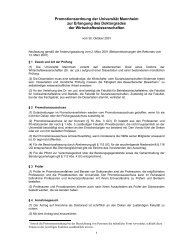Sommersemester 2006 - Abteilung Volkswirtschaftslehre der ...
Sommersemester 2006 - Abteilung Volkswirtschaftslehre der ...
Sommersemester 2006 - Abteilung Volkswirtschaftslehre der ...
Erfolgreiche ePaper selbst erstellen
Machen Sie aus Ihren PDF Publikationen ein blätterbares Flipbook mit unserer einzigartigen Google optimierten e-Paper Software.
weitesten Sinne im Vor<strong>der</strong>grund, die nicht nur die wirtschaftliche Ebene<br />
abbilden, son<strong>der</strong>n auch Gesellschaft, Kultur und Politik einbeziehen. Die<br />
damit verknüpfte Globalisierung führt nicht zu einer weltweiten Vereinheitlichung<br />
z. B. von Normen o<strong>der</strong> Wertvorstellungen, son<strong>der</strong>n lokale und<br />
sozio-kulturelle Kontexte bleiben erhalten und gestalten sich vielfältiger.<br />
Literatur:<br />
- Bathelt, H.; Glückler, J. (2002): Wirtschaftsgeographie. Stuttgart 2002.<br />
- Kulke, E. (2004): Wirtschaftsgeographie. Pa<strong>der</strong>born u. a.<br />
Prüfungsleistung:<br />
Studienabschluss Dipl.-VWL: Anwesenheitspflicht, Anfertigung einer<br />
Hausarbeit (ca. 15 Manuskriptseiten), Abgabe zu Beginn des WS <strong>2006</strong>/07<br />
ECTS: 5 ECTS<br />
Anmeldung: nicht erfor<strong>der</strong>lich<br />
Sprechstunde:<br />
Vorlesungszeit: Di., 16-17 Uhr, Verfügungsgebäude L 3-5, Raum P029<br />
Außerhalb <strong>der</strong> Vorlesungszeit: Angabe auf <strong>der</strong> homepage des Lehrstuhls<br />
Kontakt: sbeckuni-mannheim.de; paulgansuni-mannheim.de,<br />
Tel.: 0621/181-1958, -1963<br />
Sonstiges: Für alle Studierenden findet eine einführende Veranstaltung am<br />
25. April <strong>2006</strong> im Verfügungsgebäude L 3-5, Hörsaal 001, statt.<br />
Course title: Wirtschaftsgeographie II<br />
Instructor: Prof. Dr. Paul Gans<br />
Method (hours per week): lecture (2)<br />
Examination: paper<br />
ECTS-Credits: 5<br />
Course description: An important access to economic-geographical<br />
problems exists in the unequal distribution of economic activities and thus in<br />
different chances of social development and prosperity. In the first part the<br />
aim of the course is to describe spatial disparities by different indicators<br />
according to the three dimensions of sustainability and to present selected<br />
approaches to explain the spatial mismatches on national scale. In the<br />
second part the aim of the course refers to international spatial systems<br />
with their economic and non-economic links. The globalization related with<br />
these processes does not lead to a world-wide standardization e.g. from<br />
norms or value conceptions, but local socio-cultural contexts influence the<br />
consequences of the effects of globalization.<br />
Contact person: Prof. Dr. Paul Gans, Tel. 181-1963, E-Mail: paulgans@unimannheim.de,<br />
L7, 3-5, room P 029; Tuesday 16:00-17:00<br />
42















